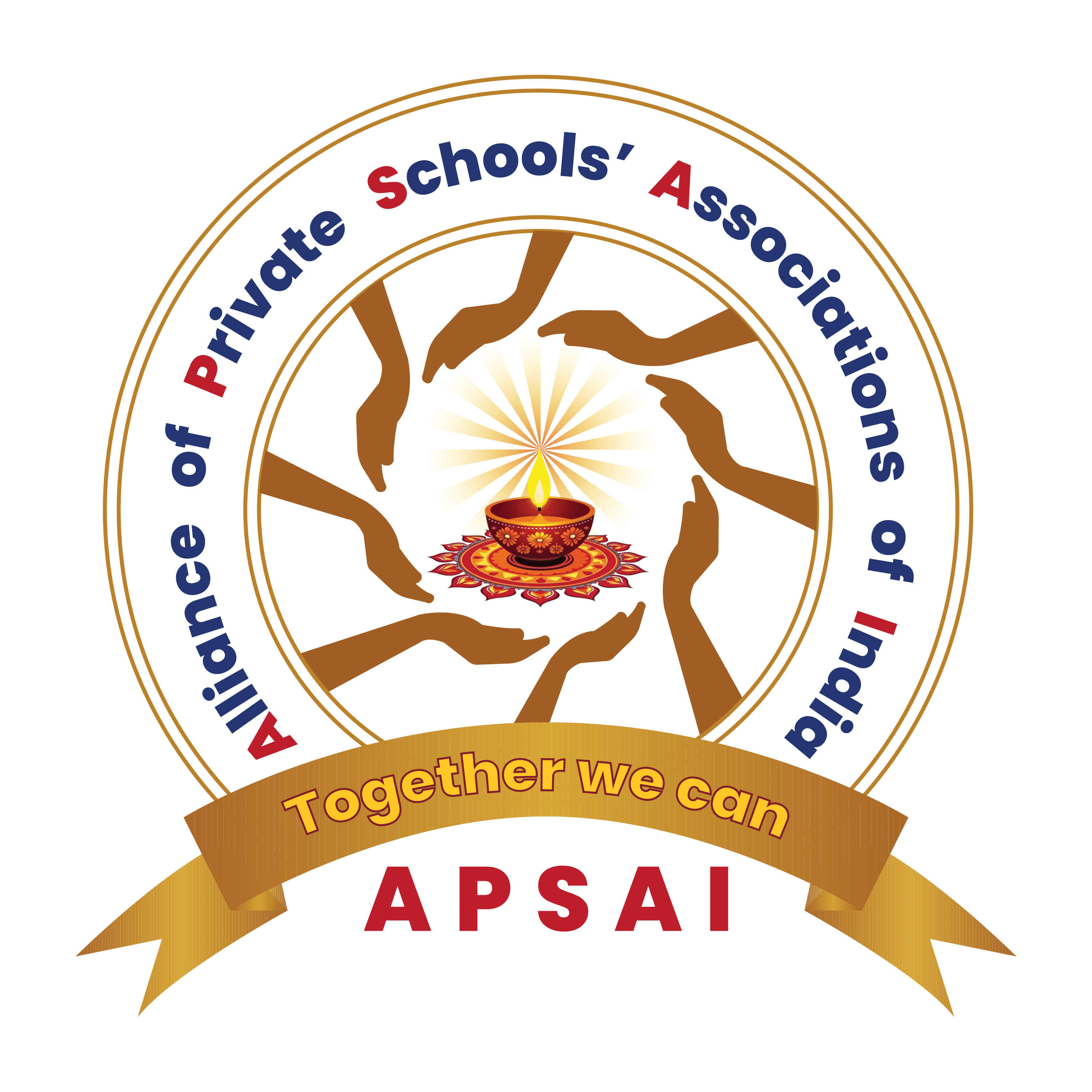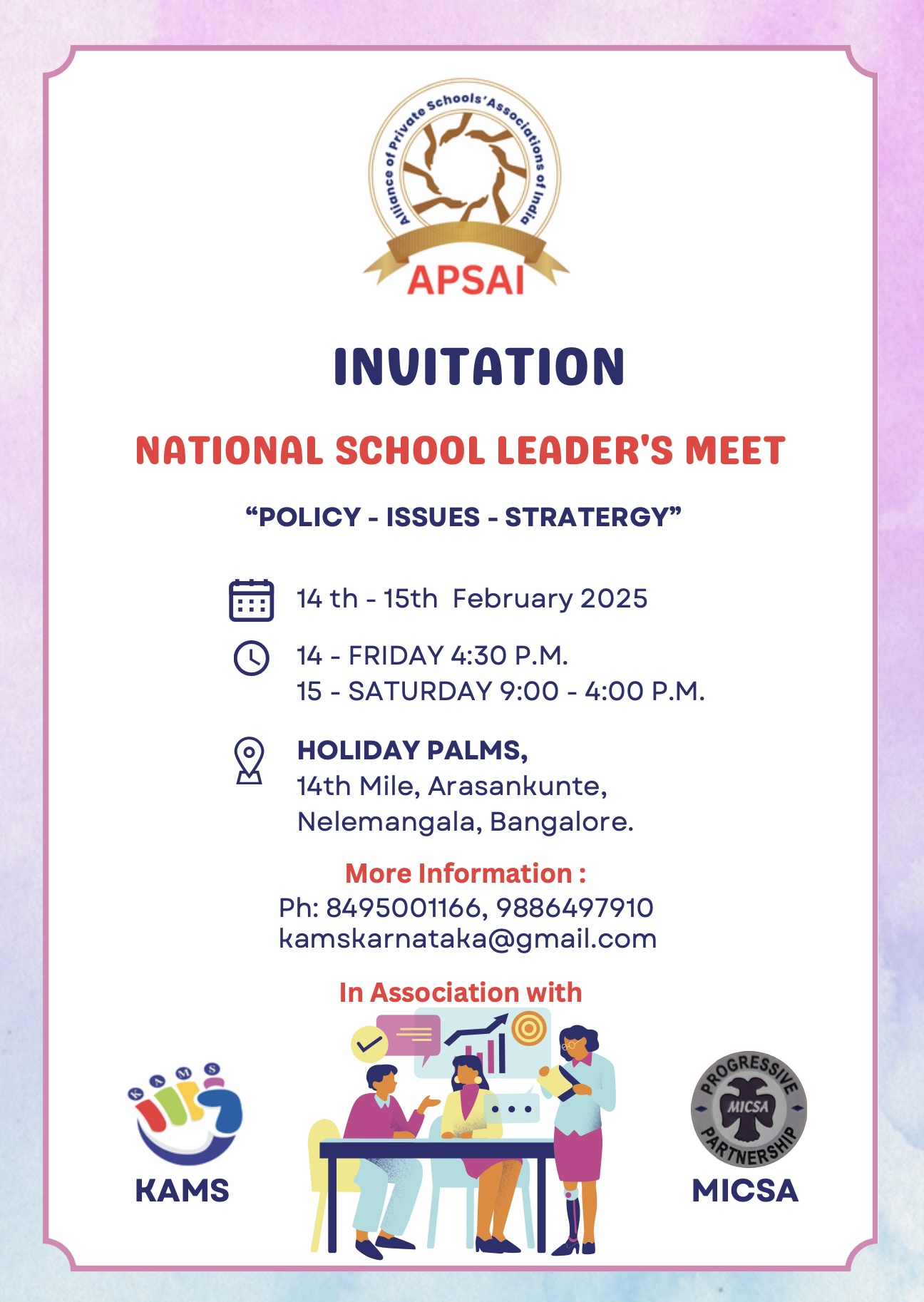 Alliance of Private Schools' Associations of India (APSAI)Together We Can
Alliance of Private Schools' Associations of India (APSAI)Together We Can
 Alliance of Private Schools' Associations of India (APSAI)Together We Can
Alliance of Private Schools' Associations of India (APSAI)Together We Can
Event
NATIONAL SCHOOL LEADER'S MEET "POLICY-ISSUES-STRATEGY"
 :::::::::::
:::::::::::
1. Conference Details
• Conference Name: National Meet of School Associations Conference
• Date: 14.02.2025 – 15.02.2025
• Location: Bangalore, Holiday Palms Hotel
• Organizer: APSAI - KAMS, MICSA Bangalore
Inauguration By Guest of Honor Shri. Puttan, MLC Ex- Deputy Chairman, Karnataka Legislative Council
2. Objectives
• Purpose of the Conference: To discuss about “POLICY - ISSUES – STRATEGY”.
• Target Audience: CBSE-ICSE Management Members, Educationists, Teachers.
• Key Topics Covered: GST Implications to RTE reimbursements, Regional Language mandates
and National Entrance Examinations.
3. Summary Of Sessions.
• Guest of Honor: Shri. Puttana MLC. Ex- Deputy Chairman, Karnataka Legislative Council who
encouraged the speakers and all the delegates and recalled the unscientific regulations of
the board, who are parallel trying to administer rather than conducting examinations, he
also raised that the retrospective implementation of various rigid rules. He assured that he
shall speak at the Vidhana Parishath, Government of Karnataka and also support to raise
issues at central level and the house of the Parliament.Shri. Puttana MLC. Ex- Deputy Chairman, Karnataka Legislative Council
• Chief Guest: Shri. M Mallesh Babu. Member of Parliament, Kolar Constituency, Karnataka
Inaugurated day 2, also spoke about the difficulties of various new rules for Private Unaided
School and expressed that having his school how difficulty to meet new regulation which are
retrospective in nature and causing financial burden in implementing same, he encouraged
that the issues raised by the boards would be addressed and give all his assistance towards
representing to the Ministry of Education, he assured and invited the stake holders and
association heads to come Delhi, assuring that he shall arrange a meeting with Ministry of
Education as well as Officials of Secretariat, Education
Shri. M Mallesh Babu. Member of Parliament, Kolar Constituency, Karnataka
• 3.1 Speaker Name: Mr. A T B Bose, Advisor at AMPS, Tamil Nadu.
ATB Bose Advisor for Association of Management of Private Schools (AMPS), Tamil Nadu.
• Topic: GST on Schools and its Effects
ATB Bose presented the GST issues, impact and its harmful effects changing the very
character of service provided by private un-aided schools. The imposition of GST on variousschool-related activities has raised significant concerns, affecting the character of
educational institutions by pushing them into the commercial segment. While core
educational services such as tuition fees remain exempt under Section 23 of the Central
Goods and Services Tax Act, 2017, several ancillary services and operational expenses are
subject to taxation, creating financial burdens on schools and impacting students, parents,
and school management across the country.
While tuition fees and supply of textbooks are exempt, additional services such as
notebooks, stationary, uniform, extracurricular coaching and even sale of scrap attract GST,
increasing the overall cost of education. GST on Rent and Infrastructure Costs with the new
rule effective from October 10, 2024, rent paid for land and buildings by schools is taxable,
further straining the financial viability of institutions, especially private unaided schools.
Schools cannot claim ITC on exempt services but still pay taxes on infrastructure, utilities,
and materials, increasing operational costs without relief. Many schools, particularly smaller
institutions, struggle with the financial burden and administrative complexities of GST,
leading to shutdowns or reduced investment in quality education.
Panelists:
• ATB Bose Advisor for Association of Management of Private Schools (AMPS), Tamil Nadu.
• Mr. R D Singh Rair, General Secreatary of Independent Schools Association (ISA),
Chandigarh.
• Mr. Ramchandran Pillai, General Secretary Kerala CBSE School Management.
Educationists and Teachers across the state of Karnataka at the Conference
Discussion: Mr. ATB Bose suggested to form a committee and should meet the Hon’ble
Finance Minister, Smt. Nirmala Sitharaman, and submit a memorandum requesting the
exemption of all education-related payments made by private un-aided schools from GST.3.2 Following this, each State Association must actively represent their concerns in their
respective GST Council meetings, applying necessary pressure for policy changes.
The government must acknowledge that education is a fundamental right, not a commercial
activity, and establish a clear, unified GST policy that exempts all essential educational
services from taxation. Schools, educational bodies, and stakeholders must collectively
advocate for these reforms to ensure education remains affordable, accessible, and free
from unnecessary financial burdens.
Speaker Name: D. Shashi Kumar, General Secretary, KAMS.
D. Shashi Kumar, General Secretary,
Associated Managements of Primary & Secondary Schools in Karnataka KAMS)
Topic: State Rules, Fixing Reimbursement amount through Go’s,
Loss incurred by Schools, Court orders, etc,.
Under RTE, the reimbursement amount fixed by each State Government at random against
the guidelines laid in RTE Act or by its own Rules. The demand to increase reimbursement
amount of Nursery which is illogically arrived at ₹8,000/- per child. Seeking explanation as to
how Government arrived at per child expenditure for Nursery when Government has no
practical heads of accounts or Nursery Schools separately to calculate the same.
The discussion centered on the inadequacy of reimbursement amounts fixed through Government
Orders (GOs), which fail to cover the actual expenses incurred by schools, leading to significant
financial losses. Furthermore, a High-Level Committee will be formed to engage with the Hon’ble HRD
Minister to present these findings and seek necessary policy revisions. Additionally, the conference
explored the feasibility of challenging the issue in the Supreme Court as a legal remedy to ensure fair
treatment of schools and sustainable financial policies.Panelists:
• ATB Bose Advisor for Association of Management of Private Schools (AMPS), Tamil Nadu.
• Mr. R D Singh Rair, General Secreatary of Independent Schools Association (ISA), Chandigarh.
• Mr. Ramchandran Pillai, General Secretary Kerala CBSE School Management Association.
• Mr. Suresh Chader, President Haryana Progressive School Conference.
Discussion: Forming a High- level Committee to meet HRD Minister. Every State Associations
needs to demand for declaring per child expenditure considering all components of
expenditure heads at public school in any ensuing year. To tackle these concerns, Suresh
Chader, President Haryana Progressive School Conference proposed to appoint a Data
Collection Committee across the country to gather relevant financial and operational data for
challenging in the Supreme Court.
3.3 Speaker Name: M. Srinivasan, MICSA President.
Mr. Srinivasan, President,
Management of Independent CBSE Schools Association (MICSA)
Topic: Teaching of Regional Language as Compulsory Subject.
Mr. Srinivasan highlighted the challenges arising from the imposition of regional language as a
compulsory first or second language for CBSE students, disregarding their preferences. In states like
Karnataka, students are mandated to take the regional language without being given a choice,
creating significant concerns. The lack of clarity on language selection in higher grades leaves
students and schools uncertain about whether to prioritize English, Hindi, or the regional language.
The unequal weightage given to these languages further adds to the confusion, making it unclear
which language to prioritize.
Mr. D Shashi Kumar raised a point about the Migrating students face additional difficulties due to the
absence of a structured and integrated approach to regional language learning, hindering their
adaptation. As it was an open panel discussion which later had many members representing across
country like Mr. Ramchandran Pillai, General Secretary Kerala CBSE School Management
Association Spoke about Kerala state where teaching mother tongue is compulsory only up
to class VIII and there is no compulsion for higher standards. Moreover, rigid language policies
enforced by different state governments exert pressure on schools, complicating admissions and
compliance with evolving regulations.3.4 Then this issue needs to be addressed at higher forums to emphasize its impact on students' learning,
mobility, and school operations. Many other school members suggested that a standardized and
flexible approach to language education is essential to ensure inclusivity, academic continuity, and
student-friendly learning across all states.
Speaker Name: A T B Bose, Advisor for AMPS, Tamil Nadu
Topic: All India Entrance Exams and its Effects.
Mr. Bose addressed the impact of All India Entrance Exams on students and the need for a
structured and fair evaluation system. A key concern raised was the scheduling of entrance
exams, ensuring they do not create excessive pressure on students. It was emphasized that
these exams should serve only as an eligibility criterion rather than a ranking system to reduce
unnecessary competition and stress.
During the open panel discussion, major concerns emerged regarding how the current
ranking-based system has led students to prioritize entrance exam preparation over their
board exams, weakening their overall academic foundation. The relentless pressure to excel
has resulted in chronic stress, anxiety, and depression among students, affecting both their
well-being and school performance. In 2024, a total of 23,33,297 students wrote NEET exam
for 56,300 Government and 52,640 Private, that is total of 1,08,940 medical seats. It means
only 4,67% of students get medical seat. Again, for a total of 17,760 seats in 23 IITs, 14,15,110
students wrote JEE main exam, but only 1.25% of students get IIT seats.
Another critical issue highlighted was the unchecked growth of coaching institutes, which
have commercialized education by dictating their own curriculum and schedules, often
disregarding the school education system. Many board members questioned the role of these
institutes in shaping student learning and called for formal regulations to standardize their
operations. The speaker urged the following,
1. No ranking should be given to entrance examination. It should only be an eligibility
test to apply to medical and IIT institutes.
2. The entrance examinations should be conducted only after two months from the
results of all the school board exams.
3. The main eligibility should be a minimum of 75% aggregated of the three main
subjects.
4. A balancing formula should be created to balance the marks of different State boards
and Central bords.
5. Only 40% of the entrance exam marks should be considered, the balance 60% marks
should be the balanced board exam marks. This will enhance the importance of school
education and the board marks.
The above guidelines must be put forward to our HRD Minister and if required approach the
Supreme court after collecting all relevant data.Delegates across the Country of various CBSE-ISCE Associations
Conclusion: The discussions highlighted critical concerns affecting the education sector, including
GST on educational institutions, inadequate RTE reimbursements, language policy challenges, and
the impact of entrance exams. A key demand was to exempt education-related payments from GST
or reduce them to the lowest slab, as taxation burdens schools and increases costs for students. The
issue of RTE reimbursements was also raised, emphasizing the need for a transparent calculation
process that reflects actual expenditures.
The imposition of regional language as a compulsory subject, particularly in states like
Karnataka, has created difficulties for students, especially migrants. The lack of clarity on
language selection in higher grades and inconsistencies across states necessitate a
standardized and flexible policy. Additionally, the undue stress caused by entrance exams,
which prioritize rankings over learning, has impacted students’ mental well-being and
academic foundation. The unregulated growth of coaching institutes has further
commercialized education, demanding the need for formal regulations.
To address these challenges, the formation of high-level committees and advocacy at
national and state levels were proposed. A unified approach is essential to safeguard the
accessibility, affordability, and quality of education, ensuring that policies prioritize students'
academic growth and well-being over commercialization.
The request of Mr. Bharat Arora Ji, President of ‘Action Committee Unaided Recognized
Schools’ – Delhi to host the next All India meet at New Delhi was welcomed by all delegates.
The next meeting is proposed during the last week of April or first week of May 2025.
Address
14TH MILE, ARASANKUNTE,
NEELAMANGALA
BENGALURU
KARNATAKA